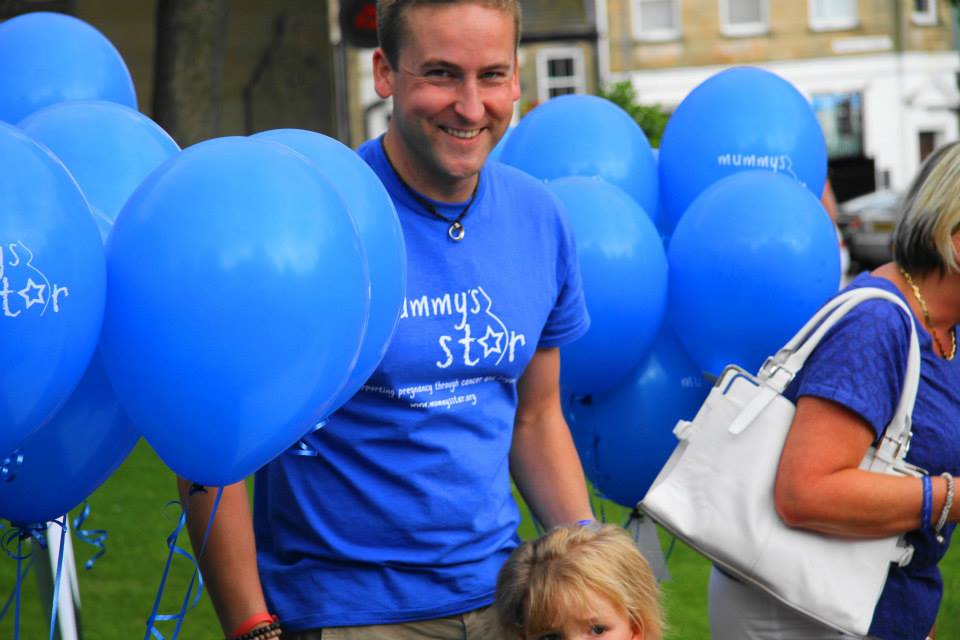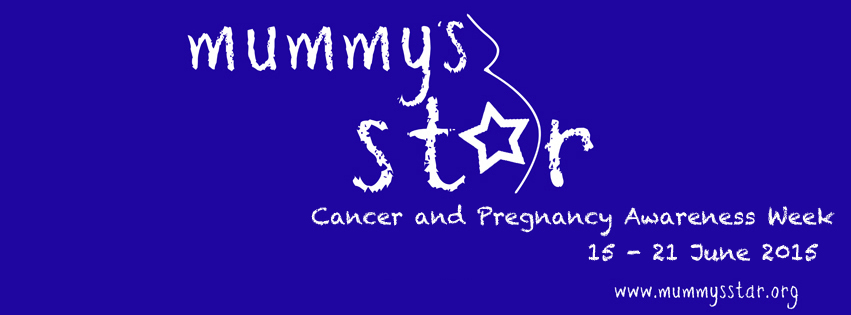Our partner Mummy’s Star, a UK charity supporting women diagnosed with cancer in and around pregnancy, is launching its second “Cancer and Pregnancy Awareness Week.”
Last year’s awareness week helped heighten awareness of how a cancer diagnosis, either in the midst of a pregnancy or soon after a birth, can impact families. This resulted in an uptake of support for the charity, which is supporting hundreds of women across the UK as they come to terms with a cancer diagnosis during what should be one of the happiest moments of their lives.
 This year, Mummy’s Star is seeking to reach new audiences among both members of the public and medical professionals, by focusing on how some of the symptoms of the most common cancers can be shielded from diagnosis by pregnancy itself. In fact, many of the women supported by the charity and diagnosed with breast, bowel, and gynecological cancers had their symptoms mistaken for being part of their pregnancy or their body returning to normal post-birth, only to subsequently receive a cancer diagnosis. For some of these women, this delay meant secondary cancers or other complications developed in the interim, which may have been avoided with an earlier diagnosis.
This year, Mummy’s Star is seeking to reach new audiences among both members of the public and medical professionals, by focusing on how some of the symptoms of the most common cancers can be shielded from diagnosis by pregnancy itself. In fact, many of the women supported by the charity and diagnosed with breast, bowel, and gynecological cancers had their symptoms mistaken for being part of their pregnancy or their body returning to normal post-birth, only to subsequently receive a cancer diagnosis. For some of these women, this delay meant secondary cancers or other complications developed in the interim, which may have been avoided with an earlier diagnosis.
Pete Wallroth, CEO and founder of Mummy’s Star, tells us more about the awareness week:
“It is clear to us and from working with those around us that cancer in pregnancy is an area that is seldom discussed in the cancer sector, and its impact on young families is not well-recognized. While the circumstance of cancer in pregnancy is deemed 'rare', it seems as though it is becoming increasingly common. I think people simply struggle to fathom that cancer can arrive and cruelly interrupt that most sacred of times for a family: pregnancy and new birth. Maybe there is some inadvertent hiding from the fact that this does really happen: as a society, we struggle to accept what we cannot possibly imagine. So this is an area that needs constant work to change perceptions and further heighten awareness.

Pete Wallroth created Mummy’s Star after tragedy hit his own family and his wife, Mair, died of breast cancer just two months after giving birth to their second child.
The first awareness week in 2014 was very much about simply making people conscious that diagnosis of cancer in pregnancy/postpartum can and does happen. This year, our focus is more on the cancers themselves, and aiming to increase symptom awareness among members of the public but also among medical professionals.
Throughout the week, we will focus of a different type of cancer each day, sharing a personal testimonial and, along it, expert commentary from cancer charities around the UK such as Beating Bowel Cancer, Lymphoma and Leukemia Awareness, and others that can provide more information on each specific form.
Awareness of symptoms of some of the common types of cancer, and how they can be shielded by pregnancy or the post-pregnancy body, must change. Sadly, a large number of the mums that we support with breast, bowel or cervical cancers went back and forth with their symptoms for anywhere between 8 and 19 months before they were finally diagnosed. This happened because they were told by either their GP or others that the symptoms they were presenting with were simply down to the pregnancy or their bodies "getting back to normal" after giving birth. This delay in diagnosis can be catastrophic – a number of the mums who did have a very delayed diagnosis have since been diagnosed with secondary cancers.
We are not suggesting that the diagnosis of cancer is an exact science. Of course it isn't. What we are trying to push for is that women are not simply dismissed because they are pregnant or postpartum. Consider all possibilities, and if in doubt, seek a second opinion. Women know their bodies better than anyone, therefore it goes without saying that they should have their concerns listened to. It can save someone’s life!”
Creating positive impact
Mummy’s Star has made a significant positive impact in many families’ lives since its launch in 2013. Last year’s awareness week helped shed light on the special needs of a family facing a cancer diagnosis during or following a pregnancy, and how their charity could help. Since then, the large majority of women they have supported were referred to them by a friend or contact who heard about the charity via social media networks.
In addition, Pete has been presenting to hospital staff across the UK, which has helped create visibility for their work, and the charity has established strong relationships with established cancer charities across the UK, as well as internationally.
“I am very pleased with the blossoming international links we have created. Working with the Pregnancy and Medicine Initiative has opened doors to others in the Pregnancy arena, such as Pregnancy Sickness Support, another subject that has huge impact but is seldom discussed and sadly often dismissed. With the 'Initiative', Caroline and her team, we are working with a group of people who share both our frustration about the lack of discussion in this area, but most importantly our desire to change this for the better, to increase choices for pregnant women and above all lift the veil from these seemingly taboo subjects.”
As part of the awareness week, Mummy’s Star will hold its first conference for healthcare professionals on 18 June, which aims to help increase their knowledge of the topic and of the treatment options and other support available to these mothers.
Pete’s ultimate objective is to make “Cancer and Pregnancy Awareness” a part of the “cancer calendar” for everyone in the sector, to ensure that it is no longer considered so rare that it does not receive the visibility or support needed by the women and families facing the situation.

